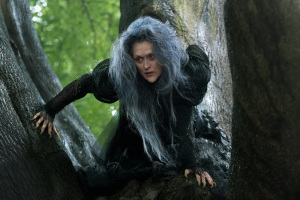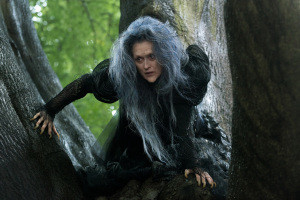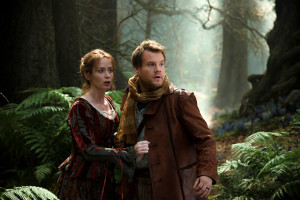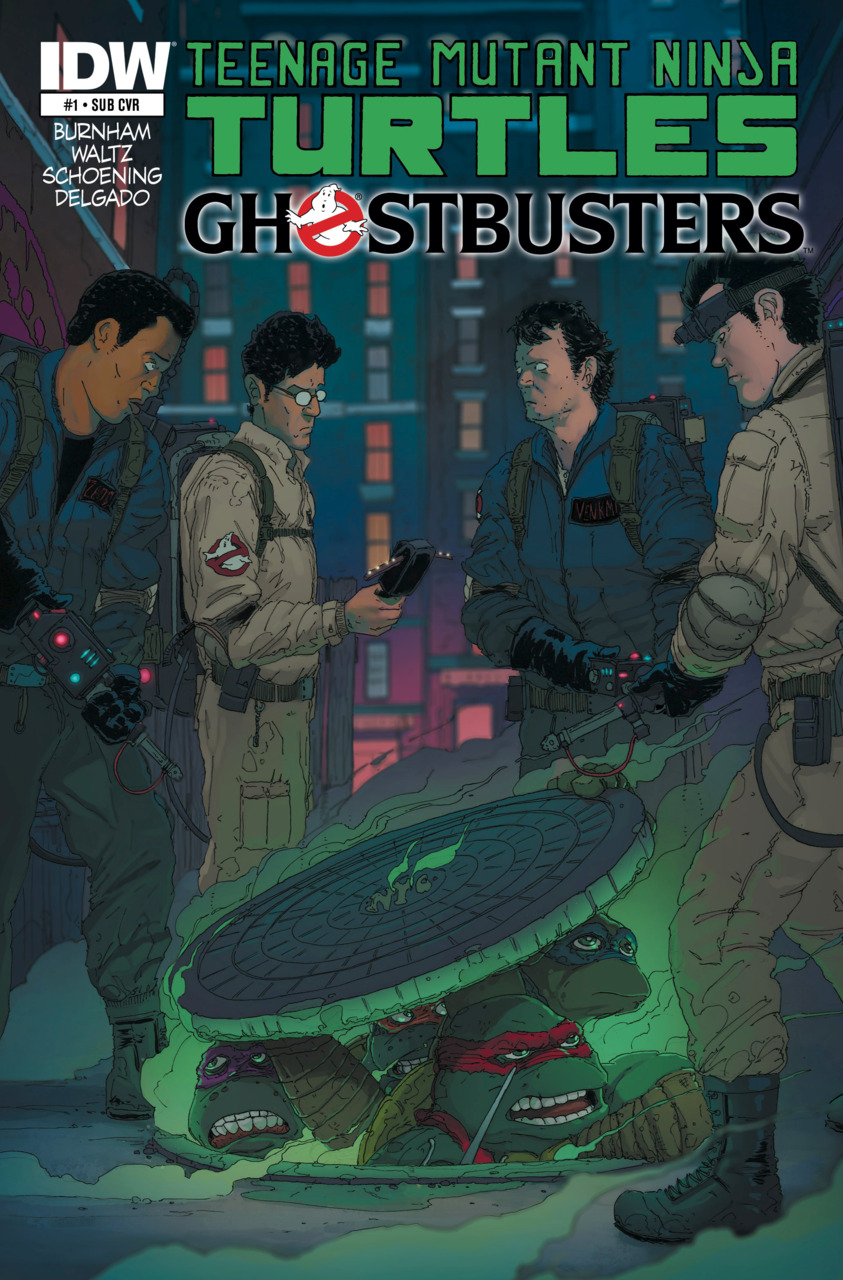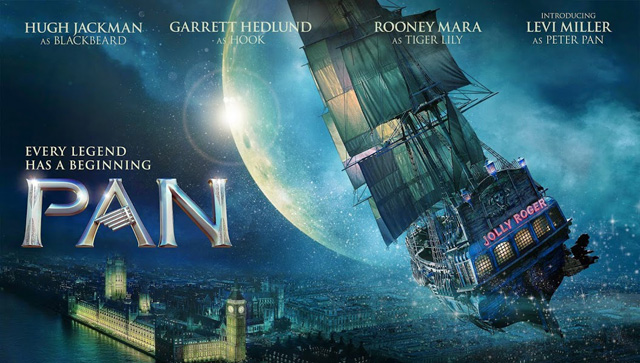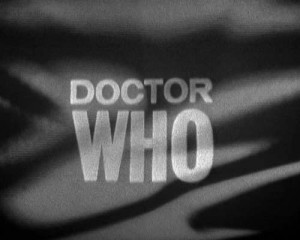If you are a fan of Into The Woods, this is not a faithful adaptation.
That should be something put front and center, before getting into the review and why it’s good or bad or any spoilers or any discussion, but it needs to be said, and said again and again. Everyone has their tipping point with screen adaptations,* so if anyone is expecting a faithful adaptation of Stephen Sondheim and James Lapine’s lavish and occasionally bleak musical, allow me to put this to bed: You may be disappointed with this movie. Especially when it hits what would normally be the second act of the play. They made massive cuts, and while what remains isn’t bad, it perhaps won’t be what you want.
However, for those who are a little more patient, or who have a little less experience, what remains here is a decent film, one that suffers from some unfortunate faults and is caught between big-screen visuals (if limited), and the kind of thing one would be glad to find on Netflix when browsing through their “watch instantly” queue– delightful, but not the kind of thing that people should wait in line for at the local theaters. A film that is, as both the title of the review and indeed a line in one of The Witch’s songs goes, “Not good, not bad, but…nice.” But it’s a film I enjoyed. For a great many reasons.
Into The Woods begins by introducing four familiar fairy-tale characters. Cinderella (Anna Kendrick), Jack (Daniel Huttlestone), Little Red Riding Hood (Lilla Crawford), and Rapunzel (Mackenzie Mauzy) as they go about their various stories, all of which take place in the titular Woods (which are located just past the ominous-looking cemetery on the edge of town that no less than three people traipse through during the upbeat musical number).
Intertwined with these stories is the originally-created story of The Baker (James Corden) and His Wife (Emily Blunt), who must gather four items from the woods to lift a curse placed on The Baker’s family courtesy of his insane next door neighbor, The Witch (Meryl Streep). If they can gather all the items by the third midnight, then The Witch will use them to reverse the spell she cast rendering The Baker’s entire family infertile.
And so our heroes set off into the woods, first The Baker on his own, and then with the help of his Wife (seriously, guys, she doesn’t have a name), to gather the items. And as they try to gather each one, they stumble through the other stories. The Baker unwillingly (at the behest of his Wife) scams Jack out of his cow Milky White for five magic beans, causing him to take them home and a massive beanstalk to accidentally grow in his front yard. The Baker’s Wife steals Rapunzel’s hair for the spell, causing her Prince (Billy Magnussen) a harder climb up the tower when he eventually goes to visit her.
Jack attempts to buy his cow back, leading to repeated trips up the beanstalk for greater and greater treasure to give the confused and flustered Baker. The Wife tries repeatedly to get a reluctant Cinderella to give up one of her slippers for the spell, while also discussing with Cinderella why she decides to run away from her Prince (Chris Pine, here reusing his deep baritone from Stretch, only slightly less creepy). And The Baker tries to steal Little Red Riding Hood’s cloak, only to send her into the arms of The Wolf (Johnny Depp, who is unnervingly convincing in the role of a zoot suit-wearing pedophile).
The other difference to the usual tales is that the actions everyone takes seem to have more consequences. As the characters bounce off and interact with each other, the stories take odd turns, sometimes for the better and sometimes for the worse. And through it all is the Witch, constantly taunting, constantly influencing, occasionally visiting her “adopted daughter” Rapunzel in her tall tower, whose motives seem somewhat unclear and at times selfishly-motivated. But above all else, there lies a simple lesson for the characters: Be careful with your wishes, because every wish has a consequence. And not learning this lesson may put happily ever after forever out of reach.
So for the first half of the movie, things actually go quite well. The stand-out performance is, of course, Meryl Streep in her role as the Witch, a cackling wild-haired creature whose sole direction seems to be “troll all the other actors as much as you possibly can.”
Streep gives the film an energy and verve that is almost impossible to match, especially in the first half of the film where she gets to leap out of trees, shriek madly, and veer all over the line between comedy and outright attempts to terrorize everything around her.
She has fun with her role as a shrieking harridan, and it’s that fun, that energy, that utter life she imbues it with that infects the rest of the film and shores up the rest of the performances quite nicely. While a lot of the actors seem to be lacking in energy or decided to play the parts as subdued as possible, they are carried along, buoyed by the enthusiasm and fun the more energetic participants are having.
The result is a fairy-tale world that while not always engaging, is pleasant. It’s not groundbreaking, but it’s enjoyable and entertaining enough watching these people stumble around in cases of mistaken identity and getting involved in each other’s stories.
There is, however, one small problem with this section, and that’s that the supporting cast far outshines the main. James Corden is perfectly serviceable in his role as the Baker, but every time anyone with a little more screen presence is in there with him, he immediately starts getting edged out. Even Emily Blunt, not the most energetic or active performance in the film, manages to push Corden to the edges of a story where he is ostensibly the main character while she plays a support role. Corden has always been better as a straight man (check out his Doctor Who episodes), the likeable but somewhat clumsy guy who stumbles through with just enough charm and rationality to make it work. The Baker, however, is a role that requires energy, as it drives the entire gorram story and is the most central character to the plot apart from maybe Cinderella. Energy that Corden doesn’t really have.
And while the child actors can be excused a bit with inexperience and a lack of things to do outside musical numbers, more puzzling is Anna Kendrick’s performance as Cinderella, where she doesn’t quite seem to know what to do with her screen time. This is actually not completely her fault, as her directions seem to be confusing and for the most part she isn’t given very much to do in the role.
She gives it the best go she has, but doesn’t really offer anything interesting to the interpretation. While she’s not as easily blown off the screen (mainly because her role requires a lot more solo scenes than any of the others), she’s also not really there as much as some of the others.
But most of this is an issue of direction more than anything else. The film seems disjointed at times, divorced from its big musical numbers in both tone and output. It nails the sense of spectacle in the bigger scenes (“Agony” especially nails the line between physical comedy and scenery-chewing bombast that the song really needs to hit it), expanding the world and entertaining the audience, but the dialogue feels slightly neglected.
It’s as if they spent all their time and budget on these musical numbers and then didn’t bother to spend time linking them together, which is a mortal sin in a character-driven piece like this. While yes, most people are coming to see the musical numbers, that isn’t all a musical film is. There’s also a story and things like that.
All of these things, however, are forgivable. The first half of the movie, despite its issues, has a bright, brassy energy that carries it through. It’s downright fun, and that seems like exactly what it should be. It sets the movie off not on the right foot, but on one that makes the journey enjoyable all the same. But then…
But then the second half of the film comes in. The second half is notably more downbeat than the first, showing the consequences of what the characters have done to reach their comfortable lives and that ultimate goal of “happily ever after.” And when the shift from dark but ultimately tongue-in-cheek to just dark and kind of melancholic comes, it takes most of that energy and fun of the movie out with it. The film becomes a slog, a plodding mess that no one seems to know what to do with, killing time to Meryl Streep’s final big number and the climactic setpiece.
The first thing that’s immediately noticeable is that with the absence of Streep as The Witch, the film immediately starts to sag. The rest of the cast just doesn’t have the energy to match, and the absence is felt immediately. The other major flaw with the performances is that with the lack of energy, everyone seems to react in underwhelming manners to the danger around them.
While the entire tone should be brought down from the first half, anyway, the concept is a lot bleaker than the first half, it doesn’t feel any darker. Just less interesting. It also feels like there are no stakes, which is egregious considering the second half of the film begins with a rampaging giantess destroying the village and most of the woods, as well as Jack’s mother getting killed onscreen.
And remember all those things mentioned in the first half of the review? Well, they get worse. Without the tone and energy of the previous half to keep them aloft, everything just falls through the floor. While there are some game performances and an excellent duet scene between Emily Blunt and Chris Pine that shifts slowly from funny to uncomfortably funny to tragic, there just isn’t any life to the film after that first half. And the performances start to get a little shabbier.
It says something that Kendrick seems more concerned with her Prince sleeping around than with the destruction of her mother’s willow tree, a point pivotal to her character during the first part of the story. It says something that Rapunzel basically slips through the story as if she never existed in it at all, and it definitely says something that the big number about who’s to blame for the sad circumstances the characters find themselves in feels more like a low-key discussion than the fiery argument it should be (That the number is only saved by Streep’s ridiculous “smite me, o mighty smiter” solo should go without saying). It says that either these people didn’t get the direction they were so sorely looking for, or it says that perhaps they shouldn’t have been cast in their roles to begin with.
And as a final point, the ending feels incredibly rushed. It feels like it goes through what should be a longer, more drawn-out series of events in almost no time at all. It also introduces a character that functions as little more than a deus ex machina in the film version, having the Baker suddenly have a chat with his father’s ghost rather than building up the relationship between the Baker and his Father. The Baker’s Wife is killed offscreen, turning an already poorly-executed tragic moment into a shrug. And while the final number does attempt to rally somewhat, by that point it is already way too far gone.
In the end, Into The Woods is an ambitious experiment, but a failed one. It has a wonderful script, makes good use of its beautiful but limited set design, and has some very interesting art and musical direction. The vocal performances all sound excellent, and the songs take at least a little bit of time to fade. But in total, the film fails in execution, leaving a less than energetic mess solely on the doorstep of those patient enough to watch it. While it might make a pleasant enough evening’s entertainment for watching it at home, those expecting to go to the theatres and see something magical would be better off actually taking a walk in the woods.
*The author’s is a secret, and also The Neverending Story.

